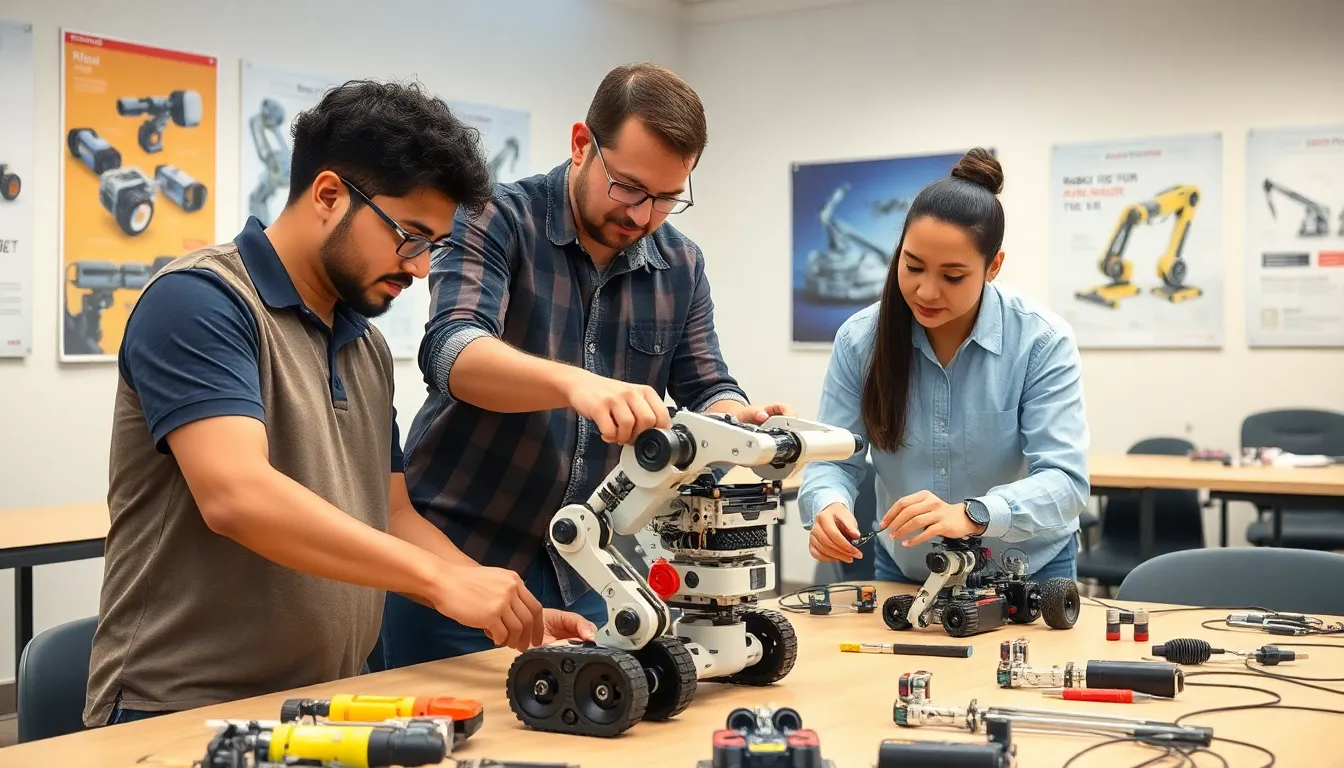Table of Contents
ToggleIn a world where robots are taking over everything from assembly lines to coffee shops, getting a robotics certification might just be your golden ticket. Imagine strutting into an interview and confidently declaring you can teach a robot to dance—or at least assemble a toaster. With technology evolving faster than a toddler in a candy store, staying ahead of the curve is essential.
Robotics certification not only boosts credibility but also opens doors to exciting career opportunities. It’s like having a secret decoder ring that lets you unlock the mysteries of automation and artificial intelligence. So, whether you’re a tech enthusiast or a career changer, diving into the world of robotics can be both fun and rewarding. Who wouldn’t want to say they’re part of the future?
Overview of Robotics Certification
Robotics certification signifies a recognized acknowledgment of expertise in robotics. Industry professionals often pursue certification to validate skills, gain essential knowledge, and improve job prospects. Many educational institutions and organizations offer various programs tailored to meet different levels of experience, from beginners to advanced practitioners.
Several key benefits accompany obtaining robotics certification. It enhances a professional’s credibility, making them more appealing to employers, especially in competitive sectors like manufacturing, healthcare, and logistics. Certifications often cover important topics such as programming, system integration, and automation technologies.
Different types of certifications exist within the field. Institutions like the Robotics Certification Standards Alliance (RCSA) provide foundational and specialized certifications. Programs may focus on robotic programming, maintenance, or design, allowing individuals to choose paths aligned to their career goals.
Certification requirements generally include specific prerequisites. Candidates usually need to complete foundational coursework and demonstrate practical capabilities through examinations or project evaluations. Many programs balance theoretical knowledge with hands-on experience, ensuring participants are well-equipped for real-world applications.
Robotics certification contributes significantly to personal and professional growth. Engaging with certification programs offers networking opportunities and access to the latest industry trends and technologies. As robotics continues to evolve, staying updated through certification becomes increasingly valuable for career advancement.
Importance of Robotics Certification

Robotics certification plays a crucial role in today’s technology-driven landscape. It offers significant benefits for career growth and skill validation.
Career Advancement
Obtaining robotics certification opens doors to numerous career opportunities. Many employers prefer certified professionals, leading to increased job prospects. Certification often correlates with higher salaries and promotions in sectors like manufacturing and healthcare. Individuals with credentials gain a competitive edge, making them more attractive candidates in the job market. They also develop a deeper understanding of industry standards, enhancing their capability to address unique challenges. Networking opportunities arise through certification programs, connecting professionals with industry leaders and peers. Engaging in training and certification processes fosters personal growth, providing insights into evolving technologies.
Skill Validation
Certification serves as a reliable measure of a professional’s expertise. It validates skills in programming, system integration, and automation technologies. Employers recognize certified individuals as knowledgeable and proficient in their fields. Numerous organizations, like the Robotics Certification Standards Alliance, offer respected programs that assure quality education. Continuous education and assessment through certification ensure individuals remain current with industry trends. Validation through certification helps professionals showcase their commitment to maintaining high standards in their work. Adopting this formal recognition boosts confidence and drives career development, enabling professionals to tackle advanced roles with assurance.
Types of Robotics Certifications
Robotics certifications fall into various categories, each designed to validate expertise in specific areas. Understanding these types helps individuals choose the right path for their career advancement.
Industry-Specific Certifications
Industry-specific certifications focus on particular sectors like manufacturing, healthcare, and logistics. Each certification addresses unique technologies and practices relevant to that industry. For example, the Robotics Certification Standards Alliance offers a manufacturing robotics certification, which emphasizes automation in production environments. Participants gain skills in programming, system integration, and maintenance, enhancing their value within their respective industries. This targeted approach allows professionals to become proficient in tools and methodologies vital to their specific fields.
Educational Certifications
Educational certifications often originate from academic institutions and vary in depth and scope. They cater to individuals at different learning stages, from beginners to advanced practitioners. A community college might offer a robotics technician certification, which includes both theoretical knowledge and hands-on experience. These programs generally require coursework in robotics fundamentals, electronics, and programming languages. Obtaining an educational certification not only provides essential knowledge but also fulfills prerequisites for more advanced certifications, enhancing overall career opportunities in robotics.
How to Obtain Robotics Certification
Obtaining robotics certification involves targeted steps and careful preparation. This section outlines recommended programs and preparation tips to facilitate the process.
Recommended Programs
Various organizations offer notable robotics certification programs. The Robotics Certification Standards Alliance (RCSA) provides recognized certifications tailored to different industry needs. Consider programs such as the Certified Robotics Technician (CRT) for entry-level qualifications or the Certified Robotics Engineer (CRE) for advanced expertise. Academic institutions also present valuable options, with colleges offering degrees focusing on robotics technology or automation. Online platforms like edX and Coursera feature specialized courses from universities, which can bolster credentials. Each of these programs provides key knowledge areas, from programming to system integration, catering to professionals at different career stages.
Preparation Tips
Preparing for robotics certification requires strategic planning and dedication. First, review the specific requirements of your chosen certification program. Foundational knowledge in robotics concepts, automation technologies, and programming languages is critical. Engage with online resources, including tutorials and forums, to refine skills and understanding. Joining study groups or attending workshops can enhance learning and foster networking opportunities with industry peers. Additionally, practical experience through internships or hands-on projects will build confidence. Practicing for evaluation components can further boost readiness, positioning candidates for success in this competitive field.
Challenges in Robotics Certification
Robotics certification presents several challenges for aspiring professionals. First, the rapidly evolving technology landscape complicates standardization for certification programs. Techniques and tools in robotics change frequently, making it difficult for programs to keep pace with industry needs.
Second, obtaining a certification often requires significant financial investment. Costs associated with coursework, exams, and materials can be substantial, creating a barrier for many individuals. Additionally, individuals seeking certification must allocate considerable time for study and practical experience, which can conflict with work and personal commitments.
Third, the requirement for hands-on experience poses a challenge. Many certification programs emphasize practical evaluations to verify skills. Gaining access to advanced robotics systems for training purposes may prove difficult, particularly for beginners lacking industry connections.
Moreover, the competitive nature of the job market intensifies the challenge of certification. Employers seek candidates with robust credentials, creating pressure on applicants to select the right certification path. Failure to choose a program aligned with specific industry needs can lead to missed opportunities.
Finally, staying up-to-date with the latest technological advancements requires ongoing education. Robotics professionals must continually invest in learning to maintain their certifications and remain relevant in the field. Balancing continuous learning with career demands presents an ongoing struggle.
These challenges necessitate careful consideration and strategic planning for those pursuing robotics certification. Understanding the requirements, costs, and opportunities can enhance success in this dynamic field.
Future Trends in Robotics Certification
Emerging technologies in robotics create a dynamic landscape for certification programs. Industry experts recognize that artificial intelligence integration into robotics demands new skill sets. Increased automation across sectors leads employers to seek candidates with specialized credentials.
Certification paths will evolve as companies adopt innovative tools and protocols. For instance, compliance with safety standards will become crucial, influencing training programs and evaluations. As robotics technology progresses, an emphasis on cybersecurity will also gain importance, ensuring systems remain secure against threats.
Data analytics is expected to feature prominently in future training modules. Certification programs may incorporate data-driven insights to enhance decision-making processes in robotics applications. Organizations are likely to prioritize certifications that cover both hardware and software proficiency to keep pace with technological advancements.
Furthermore, the trend toward online and remote learning offers flexibility for aspiring professionals. Accessibility of virtual programs broadens participation, making certifications more attainable for diverse populations. Community-driven initiatives may emerge, connecting learners with industry mentors for real-world insights.
Collaboration between educational institutions and industries will shape the future of robotics certification. Partnerships can facilitate tailored programs that meet specific workforce demands. Networking opportunities at events and workshops will further enhance the value of certification, promoting knowledge sharing among peers.
Finally, continuous learning will be a fundamental aspect of future certifications. Professionals must engage in ongoing education to remain competitive in the fast-changing robotics field. Elevated standards in certifications ensure that individuals maintain relevant skills, reflecting the evolving nature of the robotics industry.
Robotics certification is more than just a credential; it’s a key to unlocking a world of opportunities in an ever-evolving field. As technology continues to advance, professionals equipped with recognized certifications will stand out in a competitive job market.
The journey to obtaining certification may present challenges, but the rewards far outweigh the obstacles. From enhanced job prospects to higher earning potential, the benefits are clear.
Embracing robotics certification not only validates skills but also fosters personal and professional growth. As the industry evolves, staying updated through continuous learning will be essential for long-term success. Investing in certification today paves the way for a promising future in robotics.






